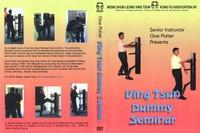Review of Clive Potter's Ving Tsun Dummy Seminar DVD
Customer/3rd Party Review: This review was done by a customer/3rd party and is listed here for you reference only. The views and opinions of the reviewer are not those of Everything Wing Chun and do not necessarily reflect EWC's views or opinions on the subject matter. It is posted, like all customer reviews, to give you more info on the product and to give you different opinions on a product so that you can make the best decision for yourself about its content. The review is NOT by an EWC employee or contractor and EWC cannot stand by anything said in any customer/3rd party review. Enjoy!
Reviewer: George Hernandez
Date: May 04, 2011
DVD Bought on: Everything Wing Chun and is also availabe for download on Everything Wing Chun Instant Access
Technical Specifications:
Title: Senior Instructor Clive Potter Presents -Ving Tsun Dummy Seminar
DVD Length: 1 hour 32 mins
Region: 0
Type: DVD-R
Format: NTSC
Video Quality: Average
Audio Quality: 3.0 out of 5.0
What It's About:
This DVD is a presentation of the basic attributes of Wooden Dummy training and its application in Wing Chun Kung-fu techniques.
Comments:
Novice usually don’t appreciate the benefit of Wooden Dummy training and at times regard it as merely a way to toughen up the arms and akin to that of hitting a tree of sorts and could serve the same purpose…the practice of Chao Sao or the “banging of arms” would perhaps make one feel that it would also provide the same benefit in Wooden Dummy practice. But, this notion is far from the truth.
Sifu Potter provides insight in the practice of the Wooden Dummy, as a unique tool to utilize the techniques of the three forms of the Wing Chun System. Again, he does not perform the wooden dummy set in sequence from beginning to end, but breaks up the form into a demonstration of its applications and principles.
Of particular importance and what is profoundly stressed in this DVD, is that the wooden dummy teaches you how to come into contact with your opponent. It not only gives you the opportunity in having something to hit, but to position your arms and to step in using footwork germane to Wing Chun.
Here’s a short narrative of what he has to say regarding technique while working with the Wooden Dummy, “the feeling of the dummy is a transition to something else…use your blocks to strike your targets…not just to block, otherwise you’re left with having to make two movements instead of one.” Practice on the wooden dummy can enhance one’s ability to allow the techniques of Wing Chun to naturally emerge from a situation, rather than relying on just drill sequences. In fact you can practice your favorite moves on the dummy, you don’t necessary have to perform a specific sequence out of the set. Of course as long as you adhere to the principles of Wing Chun centerline theory.
This DVD is the best of the three I have reviewed he has produced. Once the students’ has become familiar with the traditional sequence of the 108 set and moving to its applications, they’ll readily see how important the Wooden Dummy or Mook Jong really is in practice. Any student or teacher would find this DVD as an excellent investment and a superb addition to their collection.
Content Overview:
- Introduction
- The Wooden Dummy
- The different types of Mook Jong construction.
- Differences in materials and leg construction.
- Level arms vs uneven arms.
- The Wooden Dummy
- Contact and the opponent
- First contact
- Pulling and bringing in the opponent.
- Turning in the waist.
- The dummy’s contribution to recovery.
- The Bong Sao and Wu Sao hands.
- First contact
- Linking actions
- The feet
- The two actions.
- Noticing how the legs enter the dummy.
- Creating an arch as you move forward.
- The feeling of the dummy is a transition for the feet as well as for the arms and hands.
- The feet
- The position of the elbows in Wooden Dummy practice
- The elbow in practice
- Depends on the right distance.
- Using movement to develop power.
- Achieving the right angular position.
- Using the Bong Sao and Quan Sao hand movement
- Sinking of the elbow.
- The difference between a low and high Bong Sao
- The elbow in practice
- Posture and Structure
- Its contribution to stability in movement
- What happens when posture and structure are incorrect?
- Demonstrations
- Defenses against kicks.
- Using the Tan Sao hand.
- Double kicks—blocking and attack.
- Application against a tall person.
- Using a sweeping kick in Wing Chun.
other blogs by user


